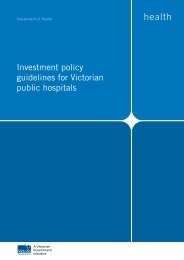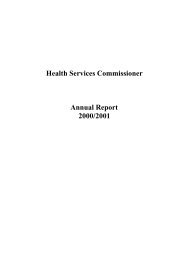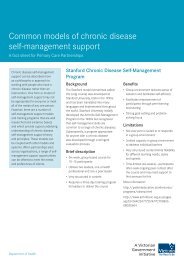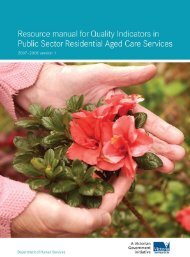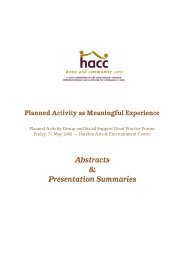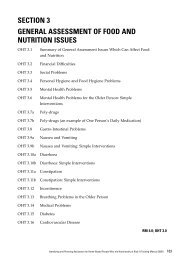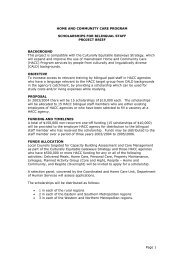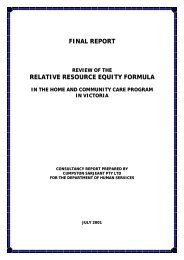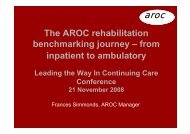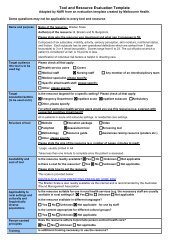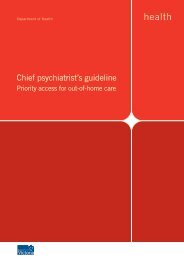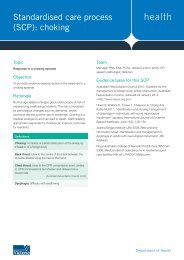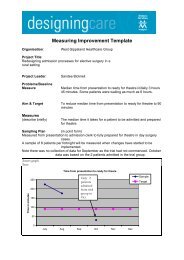Primary Health Branch policy and funding guidelines
Primary Health Branch policy and funding guidelines
Primary Health Branch policy and funding guidelines
You also want an ePaper? Increase the reach of your titles
YUMPU automatically turns print PDFs into web optimized ePapers that Google loves.
<strong>Primary</strong> <strong>Health</strong> <strong>Branch</strong> <strong>policy</strong> <strong>and</strong> <strong>funding</strong> <strong>guidelines</strong>––2006–07 to 2008–09 (2008–09 update) 23<br />
4.3 Dental <strong>Health</strong><br />
Program: Dental <strong>Health</strong><br />
Type <strong>and</strong> scope<br />
of service<br />
Funding<br />
Target group/<br />
eligibility<br />
Fees<br />
Service<br />
coordination<br />
Integrated health<br />
promotion<br />
Public dental services are currently provided in community <strong>and</strong> school dental clinics that are located in<br />
community health services, hospitals <strong>and</strong> schools. In some cases, dental care is provided by private<br />
clinicians through the Victorian Emergency Dental Scheme (VEDS), the Victorian General Dental<br />
Scheme (VGDS) <strong>and</strong> the Victorian Denture Scheme (VDS).<br />
Dental <strong>Health</strong> Services Victoria (DHSV) is responsible for the delivery of public dental services through<br />
direct provision in DHSV clinics <strong>and</strong> the Royal Dental Hospital Melbourne <strong>and</strong> <strong>funding</strong> community health<br />
services <strong>and</strong> rural hospitals under conditions set by the department.<br />
Public dental services provide routine <strong>and</strong> urgent care. People seeking urgent care are assessed, triaged<br />
<strong>and</strong> managed using the Emergency Dem<strong>and</strong> Management Strategy (EDMS).<br />
People triaged as requiring urgent care will be offered an appointment <strong>and</strong> those who require routine care<br />
will be placed on the general waiting list. Agencies are required to maintain waiting lists in accordance<br />
with departmental policies.<br />
Priority access is given to preschool <strong>and</strong> primary school aged children <strong>and</strong> dependents of health care or<br />
pensioner concession card holders in years 7 <strong>and</strong> 8 (14–15 year olds) who have left formal schooling.<br />
Eligible adults who are Aboriginal, refugees, homeless or pregnant also receive priority access.<br />
More extensive information <strong>and</strong> policies relating to the dental health program can be found on the<br />
Dentistry in Victoria website at www.health.vic.gov.au/dentistry<br />
Dental services are output funded using a <strong>funding</strong> formula based on the Department of Veteran Affairs<br />
Dental Items Schedule. Programs for special needs groups are block funded.<br />
Children: Preschool <strong>and</strong> primary school aged children, dependents of health care or pensioner concession<br />
cardholders in year 7–8 <strong>and</strong> 14–15 year olds who have left formal schooling have priority access to public<br />
dental services. Preschool aged children can visit any community dental clinic for priority access by<br />
appointment.<br />
Students in years 9–12 or 14–18 year olds who have left formal schooling have priority access to public<br />
dental services if they are dependents of a health care or pensioner concession cardholder. There is no<br />
co-payment required.<br />
Adults: <strong>Health</strong> care or pensioner concession cardholders <strong>and</strong> their dependants over the age of 18 are<br />
eligible for public dental <strong>and</strong> denture services.<br />
For up-to-date information regarding eligibility <strong>and</strong> co-payments for dental health services visit the<br />
Dentistry in Victoria website:<br />
http://www.health.vic.gov.au/dentistry/clients/dental_system.htm<br />
To achieve service integration across the health care continuum, it is expected that the practice of service<br />
coordination be embedded into service delivery.<br />
DHSV has lead responsibility for oral health promotion. DHSV has developed, <strong>and</strong> in 2008–09 will<br />
implement, an organisational health promotion plan that will begin the integration of oral health promotion<br />
into broader evidence-based interventions <strong>and</strong> strategies.



